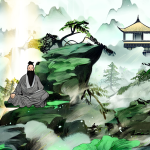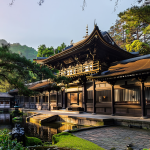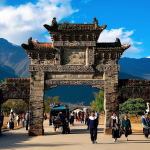《论贵粟疏》原文

圣王在上,而民不冻饥者,非能耕而食之,织而衣之也,为开其资财之道也。故尧、禹有九年之水,汤有七年之旱,而国亡捐瘠者,以畜积多而备先具也。今海内为一,土地人民之众不避汤、禹,加以亡天灾数年之水旱,而畜积未及者,何也?地有遗利,民有余力,生谷之土未尽垦,山泽之利未尽出也,游食之民未尽归农也。
民贫,则奸邪生。贫生于不足,不足生于不农,不农则不地著,不地著则离乡轻家,民如鸟兽。虽有高城深池,严法重刑,犹不能禁也。夫寒之于衣,不待轻暖;饥之于食,不待甘旨;饥寒至身,不顾廉耻。人情一日不再食则饥,终岁不制衣则寒。夫腹饥不得食,肤寒不得衣,虽慈母不能保其子,君安能以有其民哉?明主知其然也,故务民于农桑,薄赋敛,广畜积,以实仓廪,备水旱,故民可得而有也。
今农夫五口之家,其服役者不下二人,其能耕者不过百亩,百亩之收不过百石。春耕,夏耘,秋获,冬藏,伐薪樵,治官府,给徭役;春不得避风尘,夏不得避暑热,秋不得避阴雨,冬不得避寒冻,四时之间,无日休息。又私自送往迎来,吊死问疾,养孤长幼在其中。勤苦如此,尚复被水旱之灾,急政暴虐,赋敛不时,朝令而暮改。当具有者半贾而卖,无者取倍称之息;于是有卖田宅、鬻子孙以偿债者矣。而商贾大者积贮倍息,小者坐列贩卖,操其奇赢,日游都市,乘上之急,所卖必倍。故其男不耕耘,女不蚕织,衣必文采,食必粱肉;无农夫之苦,而有阡陌之得。因其富厚,交通王侯,力过吏势,以利相倾;千里游敖,冠盖相望,乘坚策肥,履丝曳缟。此商人所以兼并农人,农人所以流亡者也。今法律贱商人,商人已富贵矣;尊农夫,农夫已贫贱矣。故俗之所贵,主之所贱也;吏之所卑,法之所尊也。上下相反,好恶乖迕,而欲国富法立,不可得也。
方今之务,莫若使民务农而已矣。欲民务农,在于贵粟;贵粟之道,在于使民以粟为赏罚。今募天下入粟县官,得以拜爵,得以除罪。如此,富人有爵,农民有钱,粟有所渫。夫能入粟以受爵,皆有余者也。取于有余,以供上用,则贫民之赋可损,所谓损有余、补不足,令出而民利者也。顺于民心,所补者三:一曰主用足,二曰民赋少,三曰劝农功。今令民有车骑马一匹者,复卒三人。车骑者,天下武备也,故为复卒。神农之教曰:“有石城十仞,汤池百步,带甲百万,而亡粟,弗能守也。”以是观之,粟者,王者大用,政之本务也。
中文翻译
贤明的君主在位,而百姓不挨饿受冻的原因,并不是君主能亲自耕种供给他们食物,亲自纺织供给他们衣服,而是因为君主为百姓开辟了获取财富的途径。所以唐尧、夏禹的时候有九年的水灾,商汤的时候有七年的旱灾,但国内却没有被抛弃和瘦得不成样子的人,这是因为国家积蓄的财物多,事先早有准备啊。如今全国统一,土地和人口的数量不少于商汤、夏禹的时代,加上又没有连年的水旱灾害,但积蓄却赶不上那时的原因是什么呢?是因为土地还有未被充分利用的潜力,百姓还有多余的劳动力,生产粮食的土地没有完全开垦,山林湖泽的资源没有完全开发出来,游手好闲的人没有全部回到农业生产中去。
百姓贫穷,那么奸邪的行为就会产生。贫穷是由于物资不足,物资不足是由于不从事农业生产,不从事农业生产就不能定居在一个地方,不能定居就会离开家乡轻视家庭,百姓就像鸟兽一样四处流窜。即使有高大的城墙、深深的护城河,严厉的法律和残酷的刑罚,还是不能禁止他们。人在寒冷的时候,对于衣服的需求并不在于轻暖;人在饥饿的时候,对于食物的需求并不在于甘美;当饥寒交迫时,人们就顾不上廉耻了。人一般是一天不吃两顿饭就会感到饥饿,一年到头不添置衣服就会感到寒冷。肚子饿了没有食物吃,身上冷了没有衣服穿,即使是慈爱的母亲也不能保住她的孩子,君主又怎么能拥有他的百姓呢?贤明的君主懂得这个道理,所以让百姓致力于农桑生产,减轻赋税,大量积蓄粮食,来充实国家的粮仓,防备水旱灾害,因此百姓就能被君主所控制了。
现在一家五口的农民家庭,为他服役的人不少于两个,能耕种的土地不过一百亩,一百亩土地的收成不过一百石。他们春天耕地,夏天耘田,秋天收获,冬天储藏,还得砍柴薪,修理官府的房屋,服劳役;春天不能躲避风沙,夏天不能躲避酷热,秋天不能躲避阴雨,冬天不能躲避严寒,一年四季,没有一天休息。在私人方面,又要送别迎新,吊唁死者,探望病人,抚养孤儿,养育幼儿,所有这些费用都包括在内。像这样辛勤劳苦,还要遭受水旱灾害,再加上官府的急政暴虐,赋税征收没有定时,早上发布命令,晚上就改变。当收成好的时候,只能半价卖出粮食;收成不好的时候,就要用加倍的利息去借钱。于是就有卖田地房屋、卖妻子儿女来偿还债务的人了。而那些商人呢,大的囤积货物,获取加倍的利润;小的摆摊贩卖,也赚取丰厚的利润,他们操纵着奇货,每天在都市里游逛,趁着朝廷急需物资的时候,所卖的货物价格一定要翻倍。所以商人的男的不从事农业生产,女的不养蚕织布,穿的一定是华丽的衣服,吃的一定是精美的食物;没有农民的辛苦,却有田地里的收益。他们凭借自己的富有,结交王侯,势力超过官吏,凭借财富相互倾轧;他们千里迢迢地四处游荡,冠盖相望,坐着坚固的车子,骑着肥壮的马匹,穿着丝绸的衣服,拖着丝织的鞋子。这就是商人兼并农民土地,农民流亡在外的原因。如今法律上轻视商人,可是商人已经富贵了;法律上尊重农民,可是农民已经贫贱了。所以社会上所尊贵的,正是君主所轻视的;官吏所轻视的,正是法律所尊重的。上下相反,喜好和厌恶相违背,而想让国家富强、法律有效,那是不可能的。
当今的急务,没有比让百姓致力于农业生产更重要的了。要想让百姓致力于农业生产,关键在于使粮食变得贵重;使粮食贵重的方法,在于让百姓用粮食作为赏罚的手段。现在招募天下百姓把粮食缴纳给官府,可以封给他们爵位,可以免除他们的罪行。这样,富人可以得到爵位,农民可以得到钱财,粮食也可以得到流通。那些能够缴纳粮食来获得爵位的人,都是有余财的人。从有余财的人那里取得财物,来供给朝廷使用,那么贫苦百姓的赋税就可以减轻了,这就是所谓削减有余的来弥补不足的,法令一颁布百姓就能得到利益的道理。这种做法顺应民心,有三个好处:一是国家的费用充足,二是百姓的赋税减少,三是鼓励农业生产。现在规定百姓有一匹战马的人家,可以免除三个人的兵役。战马是国家的军事装备,所以给予免除兵役的优待。神农氏教导说:“有十仞高的石砌城墙,有百步宽的护城河,有百万带甲的士兵,可是没有粮食,还是不能守住。”由此看来,粮食是君主的重要物资,是治理国家的根本大事啊。
英文翻译
In times when a sage king reigns, the people do not suffer from cold and hunger. It is not because the king personally plows the fields to feed them or weaves cloth to clothe them. Rather, it is because the king has opened up channels for the people to acquire wealth. Thus, during the nine - year flood in the time of Emperor Yao and Shun and the seven - year drought in the time of King Tang, there were no abandoned and emaciated people in the state. This was because the state had abundant accumulated wealth and had made preparations in advance.
Now, the empire is unified, and the amount of land and population is no less than that in the times of King Tang and Emperor Yao. Moreover, there have been no consecutive years of floods and droughts. However, the accumulated wealth still cannot catch up with that in those times. Why is this? It is because there is still untapped potential in the land, the labor force of the people is still surplus, the land for grain production has not been fully cultivated, the resources of mountains and lakes have not been fully exploited, and the idlers have not all returned to agricultural production.
When the people are poor, evil deeds will emerge. Poverty stems from a shortage of resources, and a shortage of resources is due to the lack of engagement in agricultural production. Without engaging in agriculture, people cannot settle down in one place. If they cannot settle down, they will leave their hometowns and disregard their families, and the people will be like birds and beasts, wandering around. Even with high walls and deep moats, strict laws and cruel punishments, it is still impossible to stop them. When people are cold, their need for clothes is not about being light and warm; when people are hungry, their need for food is not about being delicious. When hunger and cold strike, people no longer care about decency and shame. Generally, a person will feel hungry if he does not have two meals a day and feel cold if he does not add clothes throughout the year. When one is starving without food and shivering without clothes, even a loving mother cannot protect her child. How can a ruler keep his people then? A wise ruler understands this principle, so he lets the people devote themselves to farming and sericulture, reduces taxes, and accumulates a large amount of grain to fill the state granaries and prepare for floods and droughts. In this way, the people can be controlled by the ruler.
Now, in a family of five farmers, there are at least two people serving others, and the cultivable land is no more than one hundred mu. The harvest from one hundred mu of land is no more than one hundred dan. They plow in spring, weed in summer, harvest in autumn, and store up in winter. They also cut firewood, repair government buildings, and perform corvée labor. In spring, they cannot avoid the dust; in summer, they cannot avoid the heat; in autumn, they cannot avoid the rain; in winter, they cannot avoid the cold. All year round, there is not a single day of rest. In addition, in private matters, they have to see off and welcome guests, mourn the dead, visit the sick, raise orphans, and bring up children. All these expenses are included. Such hard work, coupled with floods and droughts and the hasty and cruel policies of the government, with taxes being collected without a fixed time - early orders in the morning and changes in the evening. When there is a good harvest, they can only sell the grain at half price; when the harvest is bad, they have to borrow money at double the interest. As a result, there are people who sell their land, houses, wives, and children to pay off debts. However, those merchants, the big ones hoard goods to obtain double profits, and the small ones sit in the markets to sell goods, manipulating huge profits. They stroll around the cities every day, taking advantage of the urgent needs of the court. The goods they sell must be sold at double the price. So, the men of the merchants do not engage in farming, and the women do not raise silkworms or weave cloth. They wear gorgeous clothes and eat delicious food. Without the hardships of farmers, they have the profits from the fields. Relying on their wealth, they befriend kings and marquises, their power exceeds that of officials, and they compete with each other for profit. They travel thousands of miles, with their carriages and hats in sight of each other. They ride in strong carriages and on fat horses, wear silk clothes, and drag silk shoes. This is why merchants annex the land of farmers and farmers are forced to flee.
Now, the law looks down upon merchants, but merchants have already become rich; the law respects farmers, but farmers have already become poor. So, what society regards as honorable is what the ruler despises; what officials look down upon is what the law respects. The upper and lower levels are contrary to each other, and likes and dislikes are in conflict. If one wants the country to be rich and the laws to be effective, it is impossible.
The most urgent task nowadays is nothing more important than making the people devote themselves to agricultural production. To make the people devote themselves to agricultural production, the key lies in making grain valuable. The way to make grain valuable is to use grain as a means of reward and punishment for the people. Now, recruit the people of the world to contribute grain to the government. They can be granted official titles and exempted from crimes. In this way, the rich can get official titles, the farmers can get money, and the grain can also circulate. Those who can contribute grain to receive official titles are all wealthy people. Taking property from the wealthy to supply the court's needs can reduce the taxes of the poor people. This is the principle of reducing the surplus to make up for the deficiency, and the principle that once the order is issued, the people will benefit. This approach conforms to the will of the people and has three benefits: first, the state's expenses are sufficient; second, the people's taxes are reduced; third, agricultural production is encouraged. Now, it is stipulated that a family with a war - horse can be exempted from the military service of three people. The war - horse is the military equipment of the state, so an exemption from military service is given as a preferential treatment. Shennong (the Divine Farmer) taught, "There are stone city walls ten ren high, moats a hundred paces wide, and a million armored soldiers, but without grain, they still cannot be defended." From this, we can see that grain is an important material for the ruler and the fundamental matter in governing the country.
背景补充
创作背景
西汉初期,经济凋敝,为了恢复和发展经济,统治者采取了休养生息的政策,轻徭薄赋,鼓励农业生产,使得经济逐渐复苏。然而,随着时间的推移,一些问题也逐渐显现出来。一方面,富商大贾通过囤积居奇、操纵物价等手段积累了大量财富,势力不断膨胀;另一方面,农民由于赋税沉重、自然灾害等原因,生活日益困苦,大量土地被兼并,甚至流离失所。这种贫富差距悬殊、社会矛盾加剧的局面,对国家的稳定和发展构成了威胁。
晁错生活在汉文帝和汉景帝时期,他敏锐地察觉到了这些问题,并且深刻认识到粮食对于国家的重要性。为了改变这种局面,他向汉文帝上了一篇《论贵粟疏》,阐述了自己关于重视农业生产、贵粟抑商的主张和建议。
创作意图
- 强调粮食的重要性:晁错在文中指出“粟者,王者大用,政之本务也”,强调了粮食对于国家统治和社会稳定的重要性。他认为,只有粮食充足,国家才能有足够的物资储备来应对各种灾害和战争,才能保证社会的正常运转。
- 提出贵粟抑商的政策主张:针对当时富商大贾势力膨胀、农民贫困潦倒的社会现实,晁错提出了“贵粟”的政策主张,即通过提高粮食的地位,使粮食变得贵重,从而鼓励百姓从事农业生产。同时,他建议实行“入粟拜爵”的制度,让富人用粮食换取爵位,这样既可以增加国家的财政收入,又可以减轻农民的负担,还可以抑制商人的势力。
- 呼吁统治者重视农业:晁错希望通过对粮食重要性的阐述和贵粟抑商政策的建议,引起汉文帝对农业问题的重视,促使统治者采取切实有效的措施来促进农业生产的发展,解决社会矛盾,巩固国家的统治。
文学影响
- 政论文的经典之作:《论贵粟疏》是一篇优秀的政论文,它逻辑严密,论证充分,观点鲜明,具有很强的说服力。文章从分析社会现实问题入手,提出自己的主张和建议,层层递进,环环相扣,体现了晁错卓越的政治智慧和文学才华。
- 对后世的影响:这篇文章对后世的政论文创作产生了深远的影响,为后世政论文的写作提供了重要的借鉴和范例。它所提出的重视农业生产、贵粟抑商的思想,也成为了中国古代经济思想的重要组成部分,对中国的经济发展和社会稳定产生了积极的影响。
历史地位
《论贵粟疏》在中国古代政治思想史和经济思想史上占有重要的地位。它是西汉初期经济政策的理论总结和进一步发展的体现,反映了当时社会经济发展的要求和趋势。晁错的贵粟抑商思想,对于促进西汉农业的发展、增加国家财政收入、稳定社会秩序等方面都起到了积极的作用。同时,这篇文章也为后世统治者制定经济政策提供了重要的参考和启示,在中国历史上具有深远的历史意义。












评论功能已关闭。